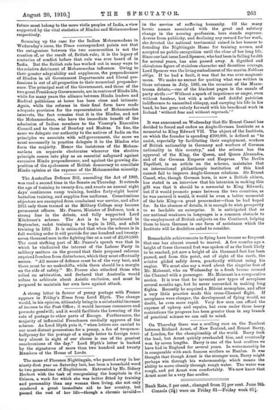Summing up the case for the Indian Mohammedans in Wednesday's
issue, the Times correspondent points out that the antagonism between the two communities is not the creation of, or the result of, British rule; it is the legacy of centuries of conflict before that rule was ever heard of in India. But the British rule has worked out in many ways to the relative detriment of Mohammedan influence. Owing to their greater adaptability and suppleness, the preponderance of Hindus in all Government Departments and liberal pro- fessions is out of all proportion to their numerical preponder- ance. The principal seat of the Government, and those of the two great Presidency Governments, are in centres of Hindu life, while for many years the alliance between Hindu leaders and Radical politicians at home has been close and intimate. Again, while the reforms in their final form have made adequate provision for the representation of Mohammedan interests, the fact remains that it is the Hindus, and not the Mohammedans, who have the immediate benefit of the admission of Indian members to the Viceroy's Executive Council and to those of Bombay and Madras. In fine, the more we delegate our authority to the natives of India on the principles we associate with self-government, the more we must necessarily in practice delegate it to the Hindus who form the majority. Hence the insistence of the Moham- medans on separate electorates wherever the elective principle comes into play as an essential safeguard against excessive Hindu preponderance, and against the growing dis- position of the spokesmen of British democracy to conciliate Hindu opinion at the expense of the Mohammedan minority.






































 Previous page
Previous page